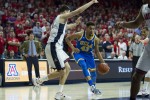The last time Jonah Bolden played college basketball, he had one of the worst seasons statswise among the 2017 NBA Draft class.
Bolden, the Bruins’ former guard/forward, averaged just 2.4 more points and 2.5 more rebounds per game in his collegiate career than LaVar Ball, who’s widely mocked in the basketball community for his uninspiring one-year tenure at Washington State.
The 6-foot-10 Aussie even averaged fewer points than Ike Anigbogu, the former UCLA forward/center whose offensive skillset and footwork could be described as belonging to a 5-year-old who just woke up from a midday nap.
Those stats wouldn’t raise any eyebrows. Yet, Bolden rose up draft boards in the weeks leading up to the NBA Draft, eventually leading to the Philadelphia 76ers selecting him with the 36th overall pick.
His out-of-nowhere rise to the NBA – from being ineligible to play as a freshman in Westwood – is due to his choice to play overseas with FMP Belgrade in the Basketball League of Serbia.
More young collegiate players – especially those who are on track to spending four lackluster years in school and are seeking a larger role on the court – should consider following a similar route: playing professionally overseas rather than transferring.
There are plenty of reasons to support this idea.
Professional players are paid to do one thing – play basketball – and they don’t have to deal with the additional stresses of college life, such as maintaining a minimum GPA or attending class. Without such distractions and an NCAA-mandated limit on the amount of practice per week, young players have the opportunity to focus on improving their skills until they are NBA-ready.
While an initial adjustment period should be expected for players moving to foreign countries, being outside their comfort zone is conducive to personal growth.
The point of going overseas is to gain experience and improve as quickly as possible compared to slogging through multiple college seasons. Competing against and teaming up with older, seasoned veterans provides different perspectives and insight into the game.
In Bolden’s single year in Serbia, he increased his per-game averages to 12.1 points and 6.7 rebounds and earned the Adriatic League Youth Player of the Year award. He is by no means a finished NBA product – he still is just a second-round pick – but his growth from a marginal starter on a middle-of-the-road NCAA team to a legitimate NBA bench option should serve as an inspiration for collegiate players who have the physical tools to reach the pro ranks.
This is a less attractive option for highly touted high school recruits looking to play professionally straight out of high school as opposed to spending their one-and-done year in college.
Experiencing the college atmosphere and trying to win an NCAA title has benefits – a top player gets more opportunities to showcase his talents for NBA teams, and it’s undoubtedly easier to pad stats against college-age opponents rather than professionals.
But for players without the potential to be a first-round pick, their path to an NBA roster should include an overseas stop.
